构词法—派生法(前后缀)
派生法英语构词法归纳
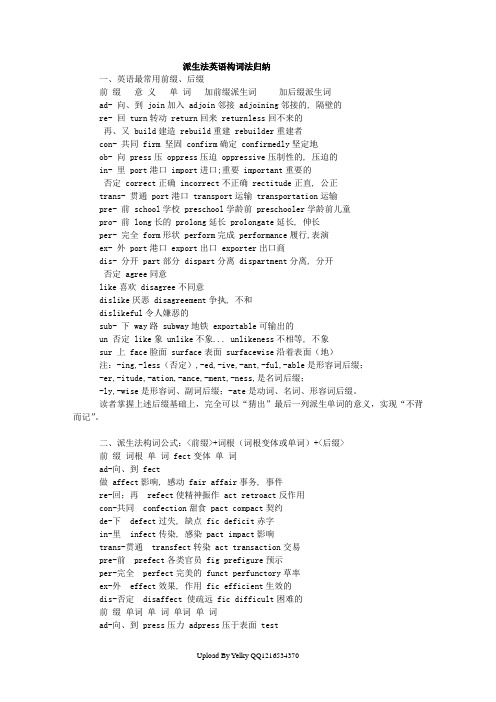
派生法英语构词法归纳一、英语最常用前缀、后缀前缀意义单词加前缀派生词加后缀派生词ad- 向、到 join加入 adjoin邻接 adjoining邻接的, 隔壁的re- 回 turn转动 return回来 returnless回不来的再、又 build建造 rebuild重建 rebuilder重建者con- 共同 firm 坚固 confirm确定 confirmedly坚定地ob- 向 press压 oppress压迫 oppressive压制性的, 压迫的in- 里 port港口 import进口;重要 important重要的否定 correct正确 incorrect不正确 rectitude正直, 公正trans- 贯通 port港口 transport运输 transportation运输pre- 前 school学校 preschool学龄前 preschooler学龄前儿童pro- 前 long长的 prolong延长 prolongate延长, 伸长per- 完全 form形状 perform完成 performance履行,表演ex- 外 port港口 export出口 exporter出口商dis- 分开 part部分 dispart分离 dispartment分离, 分开否定 agree同意like喜欢 disagree不同意dislike厌恶 disagreement争执, 不和dislikeful令人嫌恶的sub- 下 way路 subway地铁 exportable可输出的un 否定 like象 unlike不象... unlikeness不相等, 不象sur 上 face脸面 surface表面 surfacewise沿着表面(地)注:-ing,-less(否定),-ed,-ive,-ant,-ful,-able是形容词后缀;-er,-itude,-ation,-ance,-ment,-ness,是名词后缀;-ly,-wise是形容词、副词后缀;-ate是动词、名词、形容词后缀。
英语主要有三种构词法
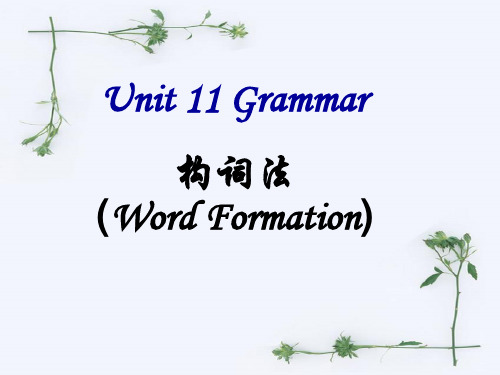
Language points (word study)
1.belief n. 信任, 信心, 信仰 常
与in连用
have a belief in 相信, 信任 That man has a strong belief in God. 那个男子虔诚地信仰上帝。 He has lost the belief in God. Beyond belief 无法令人相信;令人难以置信 His story is beyond belief. 他的话难以置信。 a common belief 普通的信念 religious belief 宗教信仰
2.名词转化为动词 e.g The hall can seat two thousand people They have booked their plane ticket.
3.形容词转化为动词
e.g. The car slowed down to half its speed.
The room gradually quieted down.
动词:
-fy (使…化) ; -ize (使…成为) e.g. simplify(简化) , satisfy , realize , organize
副词:
- ly 表示方式,程度 : freely ,badly ,truly -ward (s) 表示方向 :towards, forward, outward
后
缀
例
runner ,
词
swimmer
--er ….. 者
-ese….地方的人
Chinese, Japanese
名
-ian
精通…的人, …地方人 musician, Russian
构词法(派生)

国家或地区的( 语言) 7. -ese 国家或地区的(人;语言) Japanese, Vietnamese, Chinese, 8. -ist 主义的( 信仰… ①主义的(人);信仰…的(人) ②…家;…的操作者 Buddhist, Scottish, socialist, novelist, guitarist
6. -er ①做…动作的人 dancer, dinner 的器具cooker ②做…的器具cooker 住在或来自)… )…地方的人 ③ (住在或来自)…地方的人 Londoner, villager 精通/研究… ④精通/研究…的人 a geographer, ***an inventor, an actor
前缀: 前缀: 1.dis-表示“相反,否定;中断, 1.dis-表示“相反,否定;中断,消 除” 意。 disapprove, dishonesty, disconnect the machine, disinfect the wound, disagree
in- 否定,相反,不足” 2. in- “否定,相反,不足”表示相反 的性质。多用于adj, n.前 的性质。多用于adj, n.前。 insensitive, inattention, non-表示“ 3. non-表示“不,非” nonstop, nonnonalcoholic, nonsmoker, nonstick frying pan, un-表示“否定,相反,不足” 4. un-表示“否定,相反,不足”多 用于adj, verb前 用于adj, adv, verb前
行为(过程); );行为之 9. -ment 行为(过程);行为之 起因/手段/结果; 起因/手段/结果;…的状态 movement, replacement, development (…的 状态/性质/ 10. -ness (…的)状态/性质/程度 happiness,loudness, happiness,loudness, kindness, kindness,sadness
常见英语构词法

英语词汇常见构词法
说明:英语词汇的构词规律一般可分为三种。
一是转换法(conversion),即由一种词类转换为另一种词类;如:walk(名词),也可用作walk(动词)。
二是合成法(composition),即由两个或两个以上的词合在一起构成的词,如:basketball,airport,go-between,brunch,Eurasia,Motel 等。
三是派生法(derivation),又叫词缀法(affixation),即在某些单词前或后加上前缀(prefix)或后缀(suffix)来构成新词。
其中,第三种方法比较普遍,掌握这些构词规律对于我们学习英语和理解记忆英语单词非常有帮助。
一、前缀(Prefix,一般改变词义)
1.表范围和程度
2.表方位、方向和态度
3.表否定
4.表逆反
5.表数字
6.表贬义
7.其他
二、后缀(Suffix,一般改变词性)
1.名词后缀
2.形容词后缀
3.动词后缀
4.副词后缀。
四种构词法

四种构词法构词法主要有四种:派生法、合成法、转换法和截短法。
一、派生法在一个词的词根的前面或后面加上某个词缀来产生新词,这种构词法称为派生法。
加在前面的词缀叫前缀,加在后面的词缀叫后缀。
(一)后缀:许多名词、形容词、副词和动词是由词根加后缀构成的。
1.构成名词的常用后缀有:(1)-er,-or,-ist,-ee,-ese,-ant等用于构成表示人或物的名称。
(2) -ance, -ence, -(a)tion, -sion, -ics, -ing, -ity, -ment, -ness, -th,-ty,-ure,-ship等用于构成表示行为、性质、状态等抽象名词。
2. 构成形容词的常用后缀有:-able, -ible, -al, -ful, -less, -ish, -ive, -ous, -an, -ary, -en等。
3. 构成副词的常用后缀有:-ly, -ward, -wise等。
4. 构成动词的常用后缀的有:-ise/ize, -en, -ify等。
(二)前缀:词根加前缀多数不改变词性,只引起词义的变化。
1. 表示相反意义的前缀有:un-, dis-, in-, im-, ir-, il-, de-等。
2. 表示其他意思的前缀有:re-(重新),mpost-(后的),fore-(先的)等。
二、合成法由两个或两个以上的词合成一个新词,这种构词法称为合成法(compounding)。
合成词之间有的要用连字符连接,有的直接连接在一起。
三、转换法在词行不变的情况下,一个单词由一种词性转换成另一种词性,称为转换(conversion)。
转换后的词义与转换前的词义通常有密切的联系,但有时差异也很大。
有些双音节的词转换后,重音要发生变化。
通常名词重音在前,动词重音在后,有时读音也有不同。
四、截短法即将单词缩写,词义和词性保持不变,主要有截头、去尾、截头去尾等形式。
关于合成法:合成名词:构成方式例词名词+名词weekend周末;名词+动词daybreak黎明;名词+动名词handwriting书法;名词+及物动词+er/or pain-killer止痛药;名词+介词+名词editor-in-chief总编辑;代词+名词she-wolf母狼;动词+名词typewriter打字机。
常见构词法归纳

常见构词法归纳1.派生法(1)前缀①表示否定意义的前缀:a. 纯否定前缀:un-: unable, unemployment(失业), unload(卸载), uncover(发现、揭开、揭露), unhappy, untrue, unlike(不像), unrest(不安的,动荡的), unfair, unknown, unhealthy, unusual(不寻常的;与众不同的), uncertain(无常的、含糊的), unclear(不清楚的), unequal, unlucky, unreal, unkind, uncomfortable, uneasy(心情不安的), uninteresting, unimportant, unnecessary, unpleasant, undivided(专心的、专一的、未分开的), unreserved(无保留的、坦白的)dis-: dislike(不喜欢), disarm(解除武装;放下武器), disconnect(vt拆开,使分离), disagree, disappear, disadvantage, dishonest, disability(残疾、无能), discover(v 发现), disobey(违反、不服从)in-, im-, il-, ir-: incapable(不能的、无能力的), inability(无能力,无才能), incomplete, incorrect, inconvenient, inexpensive, impossible, immoral(不道德的), illegal(非法的), illogical(不合乎逻辑的), irregular, irrelative(无关系的)non-: non-smoker, non-stop(直达的,中途不停的), non-violent(非暴力的), nonwhite(非白人), non-member(非会员), nonparty(无党派), nonsense(无意义,胡说,废话)b. 表示错误的意义:mis-: mistake, mislead(误导), misunderstanding(n), misuse(n/vt滥用、误用、虐待), mistrust, mistreat(虐待)c. 表示“反、防、抗”的意义:anti-: antiknock(n/adj防震), antiforeign(排外的), anti-war(adj,反战的), antitank(反战车的), anti-pollution(防污染,反污染的)②表示空间位置、方向关系的前缀:ward(守卫)a- 表示“在……之上”,“向……”:aboard(在飞机上,在船上), aside(在旁边)de- 表示“在下,向下”:decrease(减少,下降), degrade(降级)en- 表示“在内,进入”:encage(入笼), enbed(上床)ex- 表示“外部,外”:exit, expand(扩张), export(输出、出口)fore- 表示“在前面”:forehead(前额), foreground(前景), foreleg, forefootin-, im- 表示“向内,在内,背于”:inland(内地、内陆), inside, indoor(s)(室内的,户内的;(s)在户内), import inter- 表示“在……间,相互”:international, interaction(相互作用), internet, interview(接见,面试)mid- 表示“中,中间”: midposition(中间位置)out- 表示“在外部,在外”:outline(轮廓,大纲,概要), outside, outward(s)(外表、外面;(s)向外地), outdoor(s) over- 表示“在上面,在外部,向上”:overlook(忽视,眺望), overhead(在头顶上,在空中), overcoat(大衣,外套), overdress(外衣), oversea(s)(海外)post- 表示“向后,在后边,次”:postscript(附言)pre- 表示“在前,在前面,提前”:prefix(前缀), preface(前言), preposition(介词)super- 表示“在…..之上,超级”:superstructure(上部建筑,上部构造), supernatural(超自然的,不可思议的), superpower(超强特权,超强大国), superman, supermarket trans- 表示“移上,转上,在那一边”:translate, transform(转变、转换、转移), transplant(移植), transportation(交通)under- 表示“在…..下面,下的”:underline(下划线,强调,在下面划线), underground, underwater, undershirt(贴身内衣,美式)up- 表示“向上,向上面,在上”:upward(s)(向上的,上升的), uphold(支撑,鼓励), uphill(上坡),upload(上传) auto- 表示“自己,独立,自动”:automobile(自动车), autobiography[ɔːtəbaɪ'ɒgrəfɪ(自传)tele- 表示“远离”:television, telephone , telegram(电报), telegraph(电报,抽象名词), telescope(望远镜)③表示时间,序列关系的前缀:fore- 表示“在前面,先前,前面”:foreword(前言), forecast(预报), foretell(预言), foresee(预见), foreknow(先知), foreknowledge(先知)mid- 表示“中,中间”:midnight, midsummer, mid-day, mid-autumn(中秋节)post- 表示“在后,后”:postwar(战后的,战后时期), postgraduate(研究生), postdate(事后日期,推迟日期)pre- 表示“在前,事先,预先”:preheat(预先加热), prewar, prehistory(史前), preview(预习), prebattle, prepay(预付)re- 表示“再一次,重新”:retell(复述), rewrite, renew(续借), reconsider(重新考虑), reuse, remarry, recycle(再生,回收利用), rebuild(重建,改造)④表示比较程度差别关系的前缀:by- 表示“副,次要的”:byproduct(副产品), bywork(副业)extra- 表示“超越,额外”:extraordinary(非凡的,特别的)over- 表示“超过,过度,太”:overeat(吃过多), oversleep(睡过头), overpraise(过奖), overwork, overact(行为过分), overdo(夸张,做得过分)under- 表示“低劣,低下”:undersize(尺寸不足), undergrown(发育不全的), underproduction(生产不足)vice- 表示“副,次”:vice-president, vice –chairman,vice-monitor⑤表示共同,相等意思的前缀:co- 表示“共同,一起”:coexist(共同生存), co-operate, co-worker, coactions(合作行动), coauthor(合作作者)⑥表示某种状态,构成形容词、副词或动词:a- afraid, alive, alone, asleep, ashamed, aloud, ahead, aside, alike, awake⑦表示分离,离开意思的前缀:a- 表示“分离,离开”:away, apartde- 表示“离去,处去”:depart, decolour⑧表示“自我”:self- self-protect(ion), self-made, self-knowledge⑨表示变换词类作用的前缀:be- befrienden- enslave(束缚;征服), enable(使能够), enrich(使充实,使肥沃,使富足), enlarge(扩大,使增大), encourage(鼓励)⑩表示数量关系的前缀:a. 表示“单一”,“一”:uni- uniform(统一服装), unicellular(单细胞)b. 表示“二,两,双”:bi- bicycle(cycle循环,周期)twi- twilight(昏暗的,黎明)c. 表示“半,一半”:semi- semiconductor(半导体), semicircle(半圆), semimonthly(半月刊), semifinal(半决赛)d. 表示“百,百分之一”:centi- centimetere. 表示“千,千分之一”:kilo- kilometer, kilogram, kilowattf. 表示“微小”:micro- microvolt(微伏特), microcomputer(微机), microscope(显微镜)g. 表示“许多,复,多数”:multi- multimedia(多媒体), multicolored, multiform, multinaturalh. 表示“千分之一、毫”:milli- millimeter, milligrami. 表示“微小、微型”:mini- minibus, miniskirt, minipark(2)后缀①名词后缀:a. 具有某种职业或动作的人:-an, -ian, -ician 表示“……地方的人,精通……的人”:American, Asian, Australian, Russian, Italian , historian(历史学家), librarian(图书管理员), electricia(电工)n, magician(魔术师), technician, musician, politician(政客)-ant,-ent 表示“……人”:merchant, servant(仆人,佣人), assistant, agent, student,-ee 表示“动作承受者”:employee(雇员), examinee(应试者), payee(收款人), interviewee-eer 表示“从事于……人”:engineer, volunteer(志愿者)-er 表示“从事某种职业的人, 某地区,地方的人”:banker, observer, Londoner, villager singer, driver, writer, speaker, traveller, buyer-or 表示“……者”:author, doctor, operator, actor, visitor, inventor, educator-ar, -ary 表示“……的人, 从事……的人”:scholar, liar, beggar, secretary, missionary-ese 表示“ ……国人,……地方的人”:Chinese, Japanese, Cantonese(广东人)-ess 表示“阴性人称名词”:actress(女演员), hostess(女主人), manageress(女经理)-ist 表示“从事……研究者,信仰……主义者”:pianist, communist, dentist, artist, chemist, socialist, typist, receptionist-icist 表示“……家,……者, ……能手”:physicist(物理学家), phoneticist(语音学家), technicist(技术师)-logist 表示“……学家,研究者”:biologist(生物学家), geologist(地质学家)b. 构成具有抽象名词的含义:-age 表示“状态,行为,身份及其结果,总称”:courage, storage, marriage, percentage-al 表示“事物的动作,过程”:refusal(拒绝), arrival, survival(幸存), denial(否认), approval(批准,认可,赞成), trial(实验)-ance, -ence 表示“性质,状况,行为,过程,总量,程度”:importance, distance, avoidance(逃避,废止), appearance, performance(性能,绩效,表演), difference, obedience(顺从,服从), presence(出席,参加), existence-ancy, -ency 表示“性质,状态,行为,过程”:frequency(频繁), urgency(紧急), efficiency(高效率),-ity 表示“性质,状态,程度”:purity(纯度(化学)), reality, equality(平等)-bility 表示“动作,性质,状态”:ability, possibility, probability, responsibility-dom 表示“等级,领域,状态”:freedom, kingdom(王国,界), wisdom(智慧,才智)-ery, -ry 表示“行为,状态,习性,性质”:bravery(勇敢,勇气), slavery(奴役)-hood 表示“资格,身份, 年纪,状态”:childhood, girlhood(少女时期), boyhood(少年时代), manhood(男子气概)-ice 表示“行为,性质,状态”:notice, justice(司法), service -ing 表示“动作的过程,结果”:building, writing, learning-ion, -ation, -ition, -sion 表示“行为的过程,结果,状况”:suggestion, action, solution, invention, direction(方向,指导), correction(改正,修正), collection, instruction(指令,指示), destruction (破坏), introduction, congratulation , dictation(听写,口述), invitation(邀请), pronunciation, examination, graduation, operation, education, information, translation, starvation(饿死,绝食), satisfaction, relation, determination(决心,果断), preparation, imagination, explanation(说明,解释), opposition(反对), competition(竞赛,比赛), description, decision, division(除法), conclusion, impression(印象), expression(表达,表示), admission(承认), permission(允许,许可), discussion -ment 表示“行为,状态,过程,手段及其结果”:disappointment(失望), treatment, movement, judgment, punishment, argument, agreement(协议), government, development, improvement(改进,改善), requirement(要求,必要条件), encouragement-ness 表示“性质,状态,程度”:goodness(adj,善良,精华),kindness, tiredness, friendliness(友谊), business, illness, happiness(幸福), willingness(乐意,心甘情愿), weakness, fairness(公平)-ism 表示“制度,主义,学说,信仰,行为”:socialism(社会主义), criticism(批评), heroism(英勇), tourism, communism(共产主义) , Marxism(马克思主义)-ship 表示“情况,性质,技巧,技能及身份,职业”:hardship(困苦,苦难), relationship, membership (资格,会员身份), friendship, ownership(所有权), scholarship(奖学金),-th, 表示“动作,性质,过程,状态”:strength, length, width, depth, wealth, truth, growth, warmth(温暖), youth -ure 表示“行为,结果”:exposure(暴露), pressure(压力), failure, procedure(手续), mixture-craft 表示“工艺”:aircraft, needlecraft, woodcraftc. 带有场所,地方的含义:-age 表示“住所,地点”:village, cottage(小屋,村舍)-ary 表示“住所,场地”:library, granary (谷仓)-ory 表示“工作场所,住处”:factory, dormitory, laboratory, observatory(天文台,气象台)②形容词后缀:a. 带有“属性,倾向,相关”的含义:-able, -ible: movable, comfortable, eatable, enjoyable, acceptable, reasonable, applicable(可适用的), visible(可见物), responsible, terrible(可怕的), horrible(恐怖的)-al: natural, additional(额外的,附加的), educational, national(国家的,国民的)-ant, -ent: distant, important, excellent-ing(表示特征:令人觉得): moving, touching, daring, interesting, exciting, disappointing , boring, amazing -ed(表示情绪:觉得): pleased, interested, surprised, worried, excited, bored, determined(决定了的,果断的), delighted(高兴的,欣喜的)-ish: foolish, bookish(出本上的,好读书的), selfish-ive: active, impressive(感人的,令人钦佩的), decisive(决定性的,果断的), active,expensive, progressive(改革的,进步的)b. 表示“相象,类似”的含义:-ish: boyish, childish(幼稚的,孩子去的)-like: manlike(有男子气概的,像男子的), childlike(天真浪漫的,像孩子的)-some: troublesome(麻烦的,讨厌的), handsome-y: milky, cloudy sunny, windy, rainy, foggy(有雾的,模糊的), healthy, wealthy, worthy, bloody(血腥的), funny, dirty, lucky, noisy, salty, smelly(发臭的), hilly(丘陵的,陡的)-ly: manly, fatherly, motherly, sisterly, brotherly, daily, weekly, monthly, quarterly, yearly, friendly, lonely, orderly, lovely(可爱的,令人愉快的), lively(活泼的,生动的), likely(很可能的), scholarly(博学的,学着风度的)c. 表示“充分的”含义:-ful: beautiful, wonderful, helpful, truthful, successful, harmful, useful, careful, forgetful, merciful(仁慈的,宽容的)-ous: dangerous, courageous(有胆量的,勇敢的), nervous(紧张不安的), mountainous(多山的), humorous(诙谐的,幽默的), various(各种各样的)d. 表示由某种物质形成,制成或生产的含义:-en: wooden, golden, woolen(羊毛的)e. 表示方向的含义:-ern: eastern, western, southern, northern, southeastern, northwestern-ward: downward(向下的), forwardf. 表示“数量关系”的含义:-teen: thirteen-ty: fifty-th: fourth, fiftiethg. 表示国籍,语种,宗教的含义:-an: Roman, European-ese: Chinese, Japanese-ish: English, Spanishh. 表示否定:-less: countless(无数的,数不尽的), stainless(不锈的), wireless, useless, endless(无止境的,连续的), priceless(无价的,贵重的), hopeless③动词后缀:-ize, ise 表示“做成,变成,……化”:modernize(现代化), democratize(民主化), organize, apologize, realize -en 表示“使成为,引起,使有”:quicken,(加快)weaken, soften, harden(变硬,变坚强)-fy 表示“使……化, 使成”:beautify, purify(净化), intensify, signify, simplify(简化), satisfy④副词后缀:-ly: possibly, swiftly(很快地), simply(简单地)-ward(s): downward, inwards(向内地), upward(向上地,上升地)-ways: always, sideways(向侧面的,一旁的)-wise: otherwise(另外的,否则,adj,adv), clockwise(顺时针方向地)注意:有的单词有双重后缀,如:use(用途)→useless(无用的)→uselessness(无用)self(自己)→selfish(自私的)→selfishness(自私)有的单词则是前后缀同时使用,如:important→importance→unimportanceregular(有规律的,有规则的)→irregular(无规律的,不规则的)→irregularity(无规律,不规则)2.合成法(1)合成名词构成方式例词名词+名词weekend周末名词+动词daybreak黎明名词+动名词handwriting书法名词+及物动词+er/or pain-killer止痛药名词+介词+名词editor-in-chief总编辑动词+名词typewriter打字机动名词+名词reading-room阅览室现在分词+名词flying-fish飞鱼形容词+名词gentleman绅士副词+动词outbreak爆发介词+名词afternoon下午代词+名词she-wolf母狼 boyfriend, girlfriend, bus-driver, playground, radioactive(放射性的), headmaster(校长), sunshine, notebook, armchair(扶手椅), wheelchair(轮椅), postcard(明信片), football, spaceship, blackboard,firefighter(消防队员), fireman, gateman(看门人,售票员), chairman(主席,会长), weatherman, businessman, armyman(军人), postman, sportsman, bedroom, reading-room, classroom, newspaper, pickpocket(扒手), she-goat(雌性山羊), editor-in-chief(主编), daybreak(破晓), handshake(握手), silkworm(蚕), outbreak(爆发)(2)合成形容词构成方式例词名词+形容词snow-white雪白的名词+现在分词English-speaking讲英语的brainwashing(洗脑的)名词+to+名词face-to-face面对面的名词+过去分词man-made人造的homemade数词+名词one-way单行的数词+名词+形容词two-year-old两岁的数词+名词+ed five-storeyed五层的four-legged(四条腿的动词+副词see-through透明的形容词+名词high-class高级的形容词+名词+ed kind-hearted, cold-blooded形容词+形容词light-blue浅蓝色的形容词+现在分词good-looking相貌好看的副词+形容词ever-green常青的副词+现在分词hard-working勤劳的副词+过去分词well-known著名的newly-built副词+名词fast-food专门提供快餐服务的介词+名词downhill下坡的由三个词构成的合成形容词: heart-to-heart, two-year-old, eight-metre-long其他合成形容词:everyday(日常的), faraway(遥远的), snow-white(雪白的), lay-off(下岗的)(3)合成动词构成方式例词名词+动词sleep-walk梦游形容词+动词white-wash粉刷副词+动词overthrow推翻(4)合成副词构成方式例词形容词+名词hotfoot匆忙地形容词+副词everywhere到处副词+副词however尽管如此介词+名词beforehand事先介词+副词forever永远(5)合成代词构成方式例词代词宾格+self herself她自己物主代词+self myself我自己形容词+名词anything任何东西(6)合成介词构成方式例词副词+名词inside在……里面介词+副词within在……之内副词+介词into进入3.转化法(1)名词→动词hand(手→传递) back(背部,后面→支持,后退)charge(费用→收费) copy(抄本,复印件→抄写,复印)flood(洪水→淹没) heat(热量→加热)paint(油漆→刷漆) phone(电话→打电话)pin(别针→装订) waste(废物→浪费)face(脸→面对) use(用途→使用)interest(兴趣→使兴趣) surprise(惊讶→使惊讶)taste(味道→品尝) smell(气味→闻)break(短暂休息→折断) present(礼物→赠送)(2)形容词→动词clean(干净→使干净,打扫) clear(清楚→清理)dirty(脏→弄脏) dry(干燥→烘干,晒干)empty(空的→倒空) free(自由→使自由,释放)slow(慢的→放慢) warm(暖和→使暖和)cool(凉的→冷却) quiet(安静→使安静)4.截短法(缩略法)截短法,即将单词缩写,词义和词性保持不变,主要有截头、去尾、截头去尾等形式。
英语构词法派生法
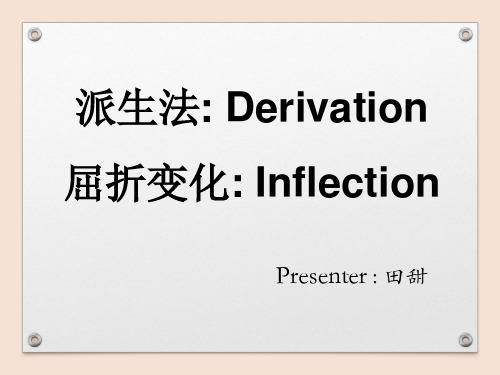
respectable comfortable valuable fashionable loveable
·
• 2. -ful (n./v.→adj.) 表示“充满……的” 如:
beautiful successful wonderful shameful hopeful
·
• 3. -less (n.→adj.) 表示“没有…… 的”。如:
派生法: Derivation 屈折变化: Inflection
Presenter : 田甜
派生法: derivation
·
• 派生法(derivation)是英语主要的构词法, 用以丰富扩大英语的词汇量。这方法是借 前缀(prefix)或后缀(postfix;suffix)之助, 制造出派生词(derivative words),主 要有名词、形容词和动词三种。
jobless homeless helpless
·• 4. -ous (n.→adj.)表示“具有……性质 的”。 如:
nervous famous dangerous poisonous humorous 幽默的
·
5. -y (n.→adj.)
funny sunny cloudy wealthy
·• 6. -ly (adj.→adv. / n.→adj.)
finally quietly lovely friendly manly
7·. 其它形式:-ish, -ic, -ical, -ive, -al(n.→adj.)
foolish basic scientific medical expensive selfish personal progressive
tall - tallest
语法小结:派生词构词法
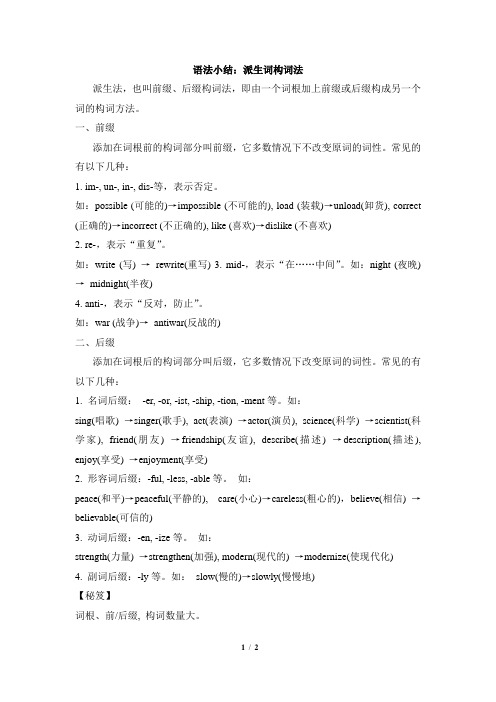
语法小结:派生词构词法派生法,也叫前缀、后缀构词法,即由一个词根加上前缀或后缀构成另一个词的构词方法。
一、前缀添加在词根前的构词部分叫前缀,它多数情况下不改变原词的词性。
常见的有以下几种:1. im-, un-, in-, dis-等,表示否定。
如:possible (可能的)→impossible (不可能的), load (装载)→unload(卸货), correct (正确的)→incorrect (不正确的), like (喜欢)→dislike (不喜欢)2. re-,表示“重复”。
如:write (写) →rewrite(重写) 3. mid-,表示“在……中间”。
如:night (夜晚)→midnight(半夜)4. anti-,表示“反对,防止”。
如:war (战争)→antiwar(反战的)二、后缀添加在词根后的构词部分叫后缀,它多数情况下改变原词的词性。
常见的有以下几种:1. 名词后缀:-er, -or, -ist, -ship, -tion, -ment等。
如:sing(唱歌) →singer(歌手), act(表演) →actor(演员), science(科学) →scientist(科学家), friend(朋友) →friendship(友谊), describe(描述) →description(描述), enjoy(享受) →enjoyment(享受)2. 形容词后缀:-ful, -less, -able等。
如:peace(和平)→peaceful(平静的), care(小心)→careless(粗心的),believe(相信) →believable(可信的)3. 动词后缀:-en, -ize等。
如:strength(力量) →strengthen(加强), modern(现代的) →modernize(使现代化)4. 副词后缀:-ly等。
如:slow(慢的)→slowly(慢慢地)【秘笈】词根、前/后缀, 构词数量大。
什么是派生词派生词的举例

什么是派⽣词派⽣词的举例 派⽣词是英语主要的构词法。
这⽅法是借前缀或后缀之助,制造出派⽣词,主要有名词、形容词和动词三种。
那么你对派⽣词了解多少呢?以下是由店铺整理关于什么是派⽣词的内容,希望⼤家喜欢! 派⽣词的释义 派⽣法(derivative)是英语主要的构词法。
这⽅法是借前缀或后缀之助,制造出派⽣词(derivative words),主要有名词、形容词和动词三种。
前缀以否定前缀(negative prefixes)un-, in-, im-, il-, ir-, non-, dis-, mis-, mal-等为主,使延伸出来的派⽣词 变成反义词。
例如:injustice(不公平的), unhappy(不⾼兴的), impossible(不可能的)等。
但要注意:英语中的前缀in-,un-通常表⽰“不”或“…的相反”的含义,因此由其构成的派⽣词⼀般具有否定的意义。
然⽽,有些由这两个前缀构成的派⽣词并⾮有否定的意义,⽽与词根同义或近义。
著名学者周海中教授在《in-,un-不⼀定表⽰“否定”》⼀⽂中就举了若⼲个例⼦,如:coming/incoming(来到),habit/inhabit(居住于),loose/unloose(解开,释放),rip/unrip(撕开)等。
这类派⽣词虽然不多,但值得注意,勿望词⽣义。
Ⅰ名词派⽣词 Balance(平衡)→imbalance(不平衡);pleasure(⾼兴)→displeasure(不⾼兴);management(管理)→ mismanagement(保管不善);efficiency(功效)→inefficiency(⽆效率)````还有很多 Ⅱ形容词派⽣词 Accurate(精准,正确)→inaccurate(不正确);patient(能忍耐的)→impatient(⽆法忍耐的). regular(有规矩的)→ irregular(不规矩的);legal(合法的)→illegal(违法的)·····等 Ⅲ动词派⽣词 Agree(赞同)→disagree(不赞同);judge(判断)→misjudge(对·····判断错误);treat(款待)→maltreat(虐待)·····等 除了否定前缀之外,其他常⽤的前缀还有 anti-, auto-, bi-, co-, counter-, de-, ex-, inter-, mono-, post, pre-, pro-, re-, sub-, super-, trans-, tri-, ultra-等。
英语构词法中的派生法

英语构词法中的派生法派生法(derivation): 在词根前面加前缀或在词根后面加后缀,从而构成一个与原单词意义相近或相反的词。
前缀(prefix): 一般改变意义,不改变词性。
表示否定的:dis-, like---dislike, appear---disappear, agree---disagree,cover---discover,il-, legal---illegal, literate---illiterate;im-, possible---impossible, polite---impolite,mortal-immortal;in-, correct---incorrect, direct---indirect, complete---incomplete;ir-, regular-irregular, relative---irrelative,revocable---irrevocable, capable of being revoked; able to be cancelled, revoke: (transitive) to take back or withdraw; cancel; rescind ? to revoke a law2. (intransitive) cardsto break a rule of play by failing to follow suit when able to do so; renege,renege. (intransitive; often foll by on) to go back (on one's promise, etc)mis-,“错误,坏” take---mistake, understand---misunderstand, fortune---misfortune, lead---mislead, mischievous;mal-, “坏,恶的”function---malfunction, maladroit笨拙的(mal+adroit灵巧的) adjective 1. skilful or dexterous 2. quick in thought or reaction, malevolent恶意的(male+vol意志+ent→坏意志) 1. wishing or appearing to wish evil to others; malicious 2. astrology having an evil influence;non-,“不,非”’ fiction---non-fiction, non-cooperation, non-negotiable, non-stop直达的,non-profit, non-commercial;un-, “不,非”happy---unhappy, fair---unfair, like---unlike(不像),certain-uncertain,known-unknown,usual-unusual,important-unimportant, accessable---unaccessable, accountable---unaccountable, fold-unfold,前缀a-,① 加在单词或词根前面,表示”不,无,非”, acentric 无中心的(a+centric中心的) asocial 不好社交的(a+social好社交的) ;amoral 非道德性的(a+moral道德的;注意:immoral apolitical.不关政治的(a+political政治的) anemia 反常的(a+nomal正常的+ous)② 加在单词前,表示”在…,…的” ,asleep 睡着的(a+sleep睡觉),aside 在边上(a+side旁边),ahead 在前地(a+head头),alive 活的(a+live活) awash .泛滥的(a+wash冲洗),alike(相似的,一样的);前缀中的:anti-, “反对,抵抗, against,opposed to,opposite of,instead”,anti-war, antitrust, antibiotic, antioxidant,antibody, antigen, anti-semitic等;auto-, “自动的,self, personally, 表示自己”,automate, automation 自动化,autograph 亲笔,autoalarm 自动报警器,autocriticism 自我批评,autorotation自动旋转,autobiography 自传,autonomous [??'tɑ?n?m?s]a. 自治的;automatic, automatically, autonomy, automobile,automated, autopsy, autograph亲笔签名,手稿, automotive, ,autocrat 独裁者,autocracy,automata, automaton, autoclave, automaker, autoindex自动索引;co-, “共同”,coworker, collegiate, colleague, cooperate;en-, “使”,enlarge, encourage, enhance, enable, enact, enroll, encompass,inter-,“相互,between在---之间”,international, internet, interview, intercontinental洲际的,interchange, interfere, interrupt, interpose,mini-, “小”,minibus, ,miniskirt, miniature, minify, minimum, minimal最低限度的,pre-,“在---之前”,pre-school, pre-reading, preview,precede v. to go or be before (someone or something) in time, place, rank, etc, precedent. a. If there is a precedent for an action or event, it has happened before, and this can be regarded as an argument for doing it again.president, precedent. unprecedented.re-, “再,又,重复”, repeat, rewrite, retell, return, review, rebound, reflect, reclaimsub-,“在下面”,subway, subordinate, submarine, suburban(urban城区),subconscious,subscribe,super-“超,在---之上”,supermarket, superman, superstar, supersonic, superficial, supervise, supernatural,tele-,“远”,telephone, telescope, television, telecommunication, telegram,后缀(suffix): 通常使词由一种词类转化为另一种词类。
派生构词法英语

派生构词法英语英语中的构词法主要有派生法(Derivation)、合成法(Composition)和转换法(Conversion)三大类。
接下来我们将依次分篇幅给读者朋友们解析这三大构词法。
今天重点解析的是现代英语构词法之派生法。
派生法(Derivation)指的是在一个词的词根(root)前面或后面加上某个词缀(affix)来产生新词,这种构词法称为派生法(derivation)或词缀法(affixation).加在前面的词缀叫前缀(prefix),加在后面的词缀叫后缀(suffix)。
一般情况下,前缀往往改变词义,不改变词性;而后缀往往改变词根的词性,有些也涉及意义的变化。
大部分前缀和后缀都有固定的意义,因而许多派生词的词义可以通过词根及词缀的意思推知。
一、前缀法(prefixation)通过在词根前面加词缀构成新词的方法叫前缀法。
一般情况下,它不改变新词的词性,只引起词义的变化。
许多名词、形容词、副词和动词是由词根加后缀构成的。
常见的表示否定或相反意义的前缀有:un-,dis-,in-,im-,ir-,il-等。
un- unhappy不高兴unlock 开锁dis- dislike不喜欢disagree不同意im- impossible不可能的improper不合适的in- informal非正式的incorrect不正确的Ir- irregular不规则的irrelevant不相关的il- illegal不合法的illogical不合理的常见的表达其他意思的前缀▶re-重新、再次regain再次获得reform改革▶mis-错误的misunderstand误解mislead误导▶anti-反、防anti-tank反坦克的anti-social危害社会的▶ex-前ex-president前总统ex-wife前妻▶Pre-预先preview预习predict预言、预测▶Post-之后的postwar 战后的postgraduate 研究生▶fore-之前的forecast预报foresee预见▶Super超级、上层supermarket超市superman超人▶sub-下面的;亚、次subway地铁subtitle副标题▶Inter-之间的,互相interact相互作用international国际的▶trans-跨越、移transport运输translate翻译▶Semi-半semi-final半决赛semiconductor半导体▶Vice-副vice-premier副总理vice-chairman副主席▶Uni-单uniform制服unilateral单方面的▶bi-双bicycle 自行车bimonthly双月的▶multi-多multinational多国的multicolor 多色的▶auto-自动、自主automation 自动化automobile汽车二、后缀法(suffixation)通过在词根后面加词构成新词的方法叫后缀法。
构词法—派生法(前后缀)
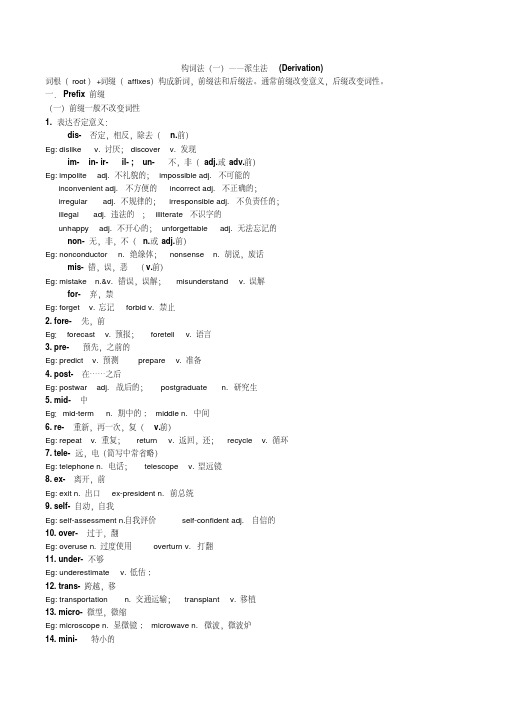
构词法(一)——派生法(Derivation)词根(root)+词缀(affixes)构成新词,前缀法和后缀法。
通常前缀改变意义,后缀改变词性。
一.Prefix 前缀(一)前缀一般不改变词性1. 表达否定意义:dis- 否定,相反,除去(n.前)Eg: dislike v. 讨厌;discover v. 发现im- in- ir- il- ; un- 不,非(adj.或adv.前)Eg: impolite adj. 不礼貌的;impossible adj. 不可能的inconvenient adj. 不方便的incorrect adj. 不正确的;irregular adj. 不规律的;irresponsible adj. 不负责任的;illegal adj. 违法的;illiterate 不识字的unhappy adj. 不开心的;unforgettable adj. 无法忘记的non- 无,非,不(n.或adj.前)Eg: nonconductor n. 绝缘体;nonsense n. 胡说,废话mis- 错,误,恶(v.前)Eg: mistake n.&v. 错误,误解;misunderstand v. 误解for- 弃,禁Eg: forget v. 忘记forbid v. 禁止2. fore- 先,前Eg:forecast v. 预报;foretell v. 语言3. pre- 预先,之前的Eg: predict v. 预测prepare v. 准备4. post- 在……之后Eg: postwar adj.战后的;postgraduate n. 研究生5. mid- 中Eg:mid-term n. 期中的; middle n. 中间6. re- 重新,再一次,复(v.前)Eg: repeat v. 重复;return v. 返回,还;recycle v. 循环7. tele- 远,电(简写中常省略)Eg: telephone n. 电话;telescope v. 望远镜8. ex- 离开,前Eg: exit n. 出口ex-president n. 前总统9. self- 自动,自我Eg: self-assessment n.自我评价self-confident adj. 自信的10. over- 过于,翻Eg: overuse n. 过度使用overturn v. 打翻11. under- 不够Eg: underestimate v. 低估;12. trans- 跨越,移Eg: transportation n. 交通运输;transplant v. 移植13. micro- 微型,微缩Eg: microscope n. 显微镜; microwave n. 微波,微波炉14. mini- 特小的Eg: miniskirt n. 迷你裙minibus 迷你公交车15. semi- 半Eg: semi-final n. 半决赛;semicircle n. 半圆16. mono- 单Eg: monologue n. 独白monopoly n. 垄断17. bi- 双Eg: bicycle n. 自行车bimonthly adj. 双月的18. tri- 三Eg: triangle n. 三角形triplet n. 三胞胎19. multi- 多Eg: multimedia n. 多媒体multinational adj. 多国的20. auto- 自动Eg: automatic adj. 自动的automobile n. 汽车21. sub- 下面的Eg: subway n. 地铁subtitle n. 字幕,副标题22. super- 超级,上层Eg: superman n. 超人;supermarket n. 超市23. inter- 之间的,相互Eg: international adj. 国际的Internet n. 超市(二)改变词性的前缀1. a- 向里,离开,加强(v.或n.前构成adj.或adv.,adj.前构成prep.或adv.)Eg: awake adj. 醒着的; along prep.沿着,顺着;aside prep.&adv. 在……旁边;在旁边2.en- 使成为(n.或adj.前构成v.)Eg: enjoy v. 享受encourage v. 鼓励enable v. 是能够二.Suffix 后缀:(改变词性)1. 名词后缀:1)-ship 状态,身份(n.或adj.后,构成抽象n.)Eg: friendship 友谊;hardship 艰难,困苦2)-ness 状态,性质(adj.后,构成抽象n.)Eg: business 生意;sadness 悲伤;happiness 幸福3)-man 人,男人(n.后)Eg:policeman 警察superman 超人4)-ion 动作,状态(v.后)Eg: action 动作invention 发明decision 决定5)-er, -or 人,动作者,职业(v.后)Eg: writer 作家;waiter 男服务员;actor男演员;doctor 医生6)-ist 职业;主义者(n.后)Eg: pianist 钢琴家;scientist 科学家;revolutionist 革命主义者7)-ese,-(ia)n 人,语言(国名后构成adj.或n.)Eg: Chinese 中国人,汉语;Japanese 日本人,日语;Russian 俄国人,俄语;Italian 意大利人,意大利语8)-th 结果,过程(adj.和v.后,构成抽象n.)Eg:truth 真相;length 长度9)-hood 身份,境遇,状态(n.后)Eg: childhood 童年;neighborhood 邻居10)-ty 性质,状态,程度(adj.后,构成抽象n.)Eg:honesty 诚实;safety 安全11)-age 状态,集合(v.或adj.后)Eg: shortage 短缺;marriage 婚姻12)-ment ……的结果,手段(v.后)Eg: movement 运动;development 发展13)–ure ……的动作或过程(v. 后)Eg: failure 失败;pleasure 愉快;pressure 压力14)–dom ……状态,地位(v.或adj.后)级别、地位(n.后)Eg: kingdom 王国freedom 自由15)–ity (adj.后)Eg: reality 现实;activity 活动;possibility 可能性16)–y 有……倾向的(v后)Eg: difficulty 困难;discovery 发现17)–al ……的过程或状态(v. 后)Eg: arrival 到达;refusal 拒绝;survival 幸存18)–ance ;–ence ……的动作或状态(v.后)Eg: dependence 独立;difference 不同;assistance 协助2. 形容词后缀:1)-ly 品质,……的,每……的(n. 后)Eg: friendly 友好的;weekly 每周的2)-able ;-ible 能够,可……的(v.或n.后)Eg: acceptable 可接受的;unforgettable 无法忘记的3)-ed ……的,动作(v.或n.后)Eg: excited 感到兴奋的;surprised 感到惊讶的4)-ing 属于,性质,动作,状态(n.后构成n.或adj.,加在v.后构成n.)Eg: exciting 令人兴奋的;surprising 令人惊奇的;shopping 购物4)-en 由……制的(n.后)Eg: wooden 木头的;woolen 羊毛的5)-ern 方向(表方向的n.后)Eg: western 西方的;northern 北方的6)-ful 充满,……的(v.或n.后)Eg: colorful 多彩的;wonderful 棒极了7)-less 无……的,没有,不(n.或v. 后)Eg: hopeless 无望的;careless 粗心的8)-ive ……的,有……的(v.后)Eg: active 活跃的;productive 多产的9)-y (充满)……的(n.后)Eg: sporty 运动的;tasty 美味的10)-ish (多为贬义词)像……似的(n.后)Eg:childish 孩子气的,幼稚的;foolish 愚蠢的11)-like 类似;像Eg: childlike 孩子般的,天真的;womanlike 像女人的12)-ous 具有……性质的(n.后)Eg: dangerous 危险的;famous 著名的;courageous 有勇气的13)-some 引起……的;有……倾向的(n.和v.后)Eg: troublesome 麻烦的;handsome 英俊的;tiresome 令人生厌的14)-ary 与……有关的;……的(n. 后)Eg: revolutionary 革命的;customary 通常的,习惯的15)-ate 富于或显示某种性质(n.后)Eg: fortunate 幸运的;passionate 激情的16)-ant;-ent 处于……状态的;进行……动作的Eg: dependent 依赖的;different 不同的;consistent 持续的17)-ic ……的,关于……的Eg: classic 经典的;historic 历史性的;energetic 精力旺盛的18)-al ……的(n.后)……的状态或过程(v.后)Eg: arrival 到达;refusal 拒绝;survival 幸存3. 动词词缀1)-ize; -ise 成为……;使像……;使……化;以……的方式对待或处理;置于(n.或adj.后)Eg: realize 实现;organize 组织;criticize 批评2)-en 使,变得(adj.后)Eg: widen 拓宽;deepen 加深;sadden 使忧伤3)-ify 使得;变得(n.或adj.后)Eg: identify 识别;classify vt.分类,归类4. 副词词缀-ly 品质,……地(adj. 后)Eg: beautifully 优美地;slowly 慢慢地5. 数词词缀:1)-teen 十几(13-19)Eg: fifteen 十五;nineteen 十九2)-ty 几十(整数)Eg: twenty 二十;thirty 三十3)-th 第几(除尾数为1,2,3的)Eg: fifth 第五;ninth 第九6. 代词词缀-self(-selves)反身代词Eg: myself 我自己;ourselves 我们自己。
三种英语基本构词法(派生、合成、转化)
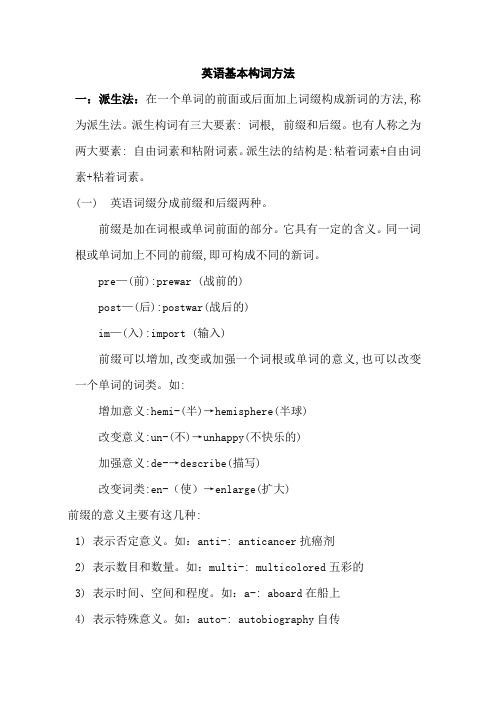
英语基本构词方法一:派生法:在一个单词的前面或后面加上词缀构成新词的方法,称为派生法。
派生构词有三大要素: 词根, 前缀和后缀。
也有人称之为两大要素: 自由词素和粘附词素。
派生法的结构是:粘着词素+自由词素+粘着词素。
(一)英语词缀分成前缀和后缀两种。
前缀是加在词根或单词前面的部分。
它具有一定的含义。
同一词根或单词加上不同的前缀,即可构成不同的新词。
pre—(前):prewar (战前的)post—(后):postwar(战后的)im—(入):import (输入)前缀可以增加,改变或加强一个词根或单词的意义,也可以改变一个单词的词类。
如:增加意义:hemi-(半)→hemisphere(半球)改变意义:un-(不)→unhappy(不快乐的)加强意义:de-→describe(描写)改变词类:en-(使)→enlarge(扩大)前缀的意义主要有这几种:1)表示否定意义。
如:anti-: anticancer抗癌剂2)表示数目和数量。
如:multi-: multicolored五彩的3)表示时间、空间和程度。
如:a-: aboard在船上4)表示特殊意义。
如:auto-: autobiography自传后缀是加在词根或单词后面的部份。
后缀有四种,即:名词后缀、形容词后缀、动词后缀和副词后缀。
后缀不仅改变词的意义,而且使单词由一种词类转化成另一种词类。
1)名词后缀,它有许多种,如:表示人:-er: worker工人;teacher教师-ist: artist艺术家;chemist药剂师表示物:-or: tractor拖拉机;generator发电机-ant: disinfectant消毒剂; dependant依附物表示抽象名词:-hood: childhood童年;neighborhood邻居关系-ship: friendship友谊;horsemanship骑马术表示集合名词:-ry: peasantry农民总称;citizenry公民总称-age: mileage英里数;teenage十几岁的时期表示场所地点:-ery: piggery养猪场;greenery花房,温室-ern: saltern制盐场;cavern洞穴表示疾病:-oma: trachoma沙眼症; neuroma神经瘤-itis: bronchitis支气管炎;arthritis关节炎表示……学::-logy: zoology动物学;anthropology人类学-ics: electronics电子学;statistics统计学2)形容词后缀表示一种事物具有或属于某种性质或状态。
英语构词法-派生法

• 6. -dom 表示状况,领域。 如:
freedom kingdom
• 7. 其它形式:-th,-ty,-ence (ance)
death length truth
honesty difficulty ability
importance silence difference
• III.动词后缀
• 6. -ly (adj.→adv. / n.→adj.)
finally quietly lovely friendly manly
7. 其它形式:-ish, -ic, -ical, -ive, -al(n.→adj.)
foolish basic scientific medical expensive selfish personal progressive
• 3. re- 表示“重新,再”, 用在动词 前。如:
rebuild 重新建造 recycle 再循环 reconsider 重新考虑 review 复习
Ⅱ.后缀 (postfix; suffix)
• I.形容词后缀
1. -able (n./v.→adj.)表示“可以……的;显 示……性质”。 如:
英语构词法-派生法
派生法: derivation
• 派生法(derivation)是英语主要的构词法, 用以丰富扩大英语的词汇量。这方法是借 前缀(prefix)或后缀(postfix;suffix)之助, 制造出派生词(derivative words),主 要有名词、形容词和动词三种。
Ⅰ.前缀(prefix)
»
respectable comfortable valuable fashionable loveable
英语构词法中的派生法
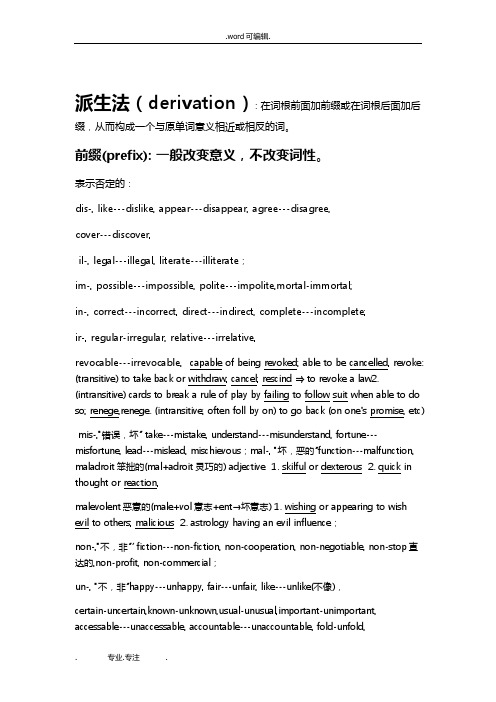
派生法(derivation): 在词根前面加前缀或在词根后面加后缀,从而构成一个与原单词意义相近或相反的词。
前缀(prefix): 一般改变意义,不改变词性。
表示否定的:dis-, like---dislike, appear---disappear, agree---disagree,cover---discover,il-, legal---illegal, literate---illiterate;im-, possible---impossible, polite---impolite,mortal-immortal;in-, correct---incorrect, direct---indirect, complete---incomplete;ir-, regular-irregular, relative---irrelative,revocable---irrevocable, capable of being revoked; able to be cancelled, revoke: (transitive) to take back or withdraw; cancel; rescind ⇒ to revoke a law2. (intransitive) cards to break a rule of play by failing to follow suit when able to do so; renege,renege. (intransitive; often foll by on) to go back (on one's promise, etc)mis-,“错误,坏” take---mistake, understand---misunderstand, fortune---misfortune, lead---mislead, mischievous;mal-, “坏,恶的”function---malfunction, maladroit笨拙的(mal+adroit灵巧的) adjective 1. skilful or dexterous 2. quick in thought or reaction,malevolent恶意的(male+vol意志+ent→坏意志) 1. wishing or appearing to wish evil to others; malicious 2. astrology having an evil influence;non-,“不,非”’ fiction---non-fiction, non-cooperation, non-negotiable, non-stop直达的,non-profit, non-commercial;un-, “不,非”happy---unhappy, fair---unfair, like---unlike(不像),certain-uncertain,known-unknown,usual-unusual,important-unimportant, accessable---unaccessable, accountable---unaccountable, fold-unfold,前缀a-,① 加在单词或词根前面,表示”不,无,非”, acentric 无中心的(a+centric中心的)asocial 不好社交的(a+social好社交的) ;amoral 非道德性的(a+moral道德的;注意:immoral apolitical.不关政治的(a+political政治的) anemia 反常的(a+nomal正常的+ous)② 加在单词前,表示”在…,…的” ,asleep 睡着的(a+sleep睡觉),aside 在边上(a+side旁边),ahead 在前地(a+head头),alive 活的(a+live活) awash .泛滥的(a+wash冲洗),alike(相似的,一样的);前缀中的: anti-, “反对,抵抗, against,opposed to,opposite of,instead”,anti-war, antitrust, antibiotic, antioxidant,antibody, antigen, anti-semitic等;auto-, “自动的,self, personally, 表示自己”, automate, automation 自动化,autograph 亲笔,autoalarm 自动报警器,autocriticism 自我批评,autorotation 自动旋转,autobiography 自传,autonomous [ɔː'tɑːnəməs]a. 自治的;automatic, automatically, autonomy, automobile,automated, autopsy, autograph亲笔签名,手稿, automotive, ,autocrat 独裁者,autocracy,automata, automaton, autoclave, automaker, autoindex自动索引;co-, “共同”,coworker, collegiate, colleague, cooperate;en-, “使”,enlarge, encourage, enhance, enable, enact, enroll, encompass,inter-,“相互,between在---之间”, international, internet, interview, intercontinental洲际的,interchange, interfere, interrupt, interpose,mini-, “小”, minibus, ,miniskirt, miniature, minify, minimum, minimal最低限度的,pre-,“在---之前”,pre-school, pre-reading, preview,precede v. to go or be before (someone or something) in time, place, rank, etc,precedent. a. If there is a precedent for an action or event, it has happened before, and this can be regarded as an argument for doing it again.president, precedent. unprecedented.re-, “再,又,重复”, repeat, rewrite, retell, return, review, rebound, reflect, reclaimsub-,“在下面”, subway, subordinate, submarine, suburban(urban城区),subconscious,subscribe,super-“超,在---之上”,supermarket, superman, superstar, supersonic, superficial, supervise, supernatural,tele-,“远”, telephone, telescope, television, telecommunication, telegram, 后缀(suffix): 通常使词由一种词类转化为另一种词类。
构词法中的派生词

构词法中的派生词构词法是语言学中的一个重要分支,研究的是词汇的形成和变化规律。
在构词法中,派生是一种常见的词形变化方式,通过增加前缀、后缀或者进行词干的内部变化,形成新的派生词,丰富了词汇的含义和形式。
本文将探讨构词法中的派生词,并举例说明其应用场景。
一、前缀派生词前缀派生是指在词根前面加上特定的前缀,以形成新的词汇。
常见的前缀包括un-、dis-、re-等。
1. un-前缀派生词un-前缀表示否定、反向的含义,使原词的意思相反或相对。
例如:- happy(快乐的)→ unhappy(不快乐的)- lock(锁)→ unlock(解锁)2. dis-前缀派生词dis-前缀表示否定、相反的含义,有时也表示分离、除去等意思。
例如:- agree(同意)→ disagree(不同意)- appear(出现)→ disappear(消失)3. re-前缀派生词re-前缀表示再次、重新的含义,常用于表示反复或重复的动作。
例如:- build(建造)→ rebuild(重建)- print(打印)→ reprint(重新印刷)二、后缀派生词后缀派生是指在词根后面加上特定的后缀,以形成新的词汇。
常见的后缀包括-er、-able、-ize等。
1. -er后缀派生词-er后缀常用于名词和动词的转化,表示施动者、从事者或物体的属性。
例如:- sing(唱歌)→ singer(歌手)- teach(教学)→ teacher(教师)2. -able后缀派生词-able后缀常用于形容词和动词的转化,表示具有某种性质或能力。
例如:- understand(理解)→ understandable(可理解的)- comfort(安慰)→ comfortable(舒适的)3. -ize后缀派生词-ize后缀常用于动词的转化,表示使某事发生或成为某种状态。
例如:- modern(现代的)→ modernize(使现代化)- organize(组织)→ organize(组织化)三、词干内部变化除了前缀和后缀的派生方式外,还有一种常见的派生方式是通过词干内部的变化来形成新的词汇,包括变音、变位等形式。
英语构词法 之 派生词 前缀
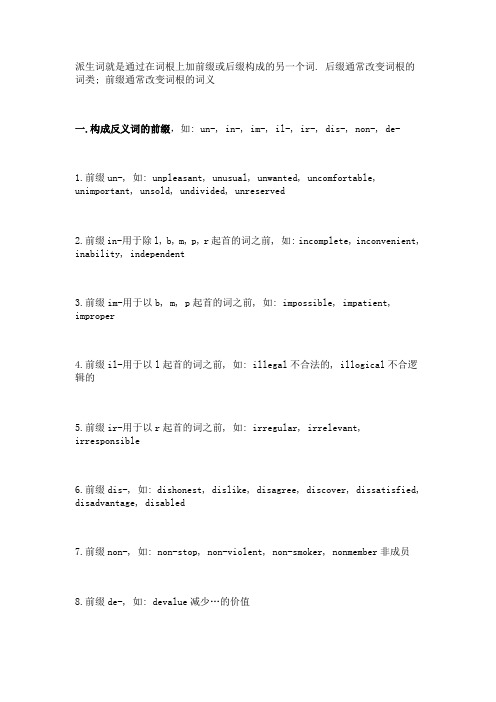
派生词就是通过在词根上加前缀或后缀构成的另一个词. 后缀通常改变词根的词类; 前缀通常改变词根的词义一.构成反义词的前缀,如: un-, in-, im-, il-, ir-, dis-, non-, de-1.前缀un-, 如: unpleasant, unusual, unwanted, uncomfortable, unimportant, unsold, undivided, unreserved2.前缀in-用于除l, b, m, p, r起首的词之前, 如: incomplete, inconvenient, inability, independent3.前缀im-用于以b, m, p起首的词之前, 如: impossible, impatient, improper4.前缀il-用于以l起首的词之前, 如: illegal不合法的, illogical不合逻辑的5.前缀ir-用于以r起首的词之前, 如: irregular, irrelevant, irresponsible6.前缀dis-, 如: dishonest, dislike, disagree, discover, dissatisfied, disadvantage, disabled7.前缀non-, 如: non-stop, non-violent, non-smoker, nonmember非成员8.前缀de-, 如: devalue减少…的价值二.其他前缀:1.前缀en-表示“使得…, 使成为…”, 如: enlarge扩大, enable使能够, endanger危害, encourage鼓励2.前缀re-表示“再, 重新”, 如: reprint, redesign, rebuild, reuse, review, repay, rewrite3.前缀mis-表示“坏的, 错误的, 不利的”, 如: misunderstand, misspell拼错, misplace放错, misname误称, mislead误导, misremember记错4.前缀counter-表示“反对, 逆, 对付”, 如: counterculture反主流文化, counterpart对应的人或物, countermeasure对抗手段, countermarch向后转行进5.前缀anti-表示“反对, 抵抗, 排斥”, 如: anti-American反美分子, antigas防毒气的, antisocial孤僻的, anticraft防空炮火6.前缀pro-表示“赞成…的, 亲…的”, 如: pro-American亲美的7.前缀mono-表示“单一, 单独”, 如: monoplane单翼飞机, monologue独白, monotone单独8.前缀semi-表示“一半的”, 如: semifinal半决赛, semimonthly半月地, semiconductor半导体, semicircle半圆9.前缀bi-表示“两个的, 两倍的, 双重的”, 如: bicycle, biweekly双周的, biyearly每两年的, bilingual双语的10.前缀tri-表示“三, 三倍, 三重的”, 如: tricycle三轮车, triangle三角形11.前缀ultra-表示“极端的, 超过的, 过于的”, 如: ultra-left极左的, ultra-democracy极端民主, ultra-short超短的, ultrasound超声12.前缀over-表示“过度的, 太多的; 在上面; 全面地; 超越; 翻倒”, 如: overbold过于胆大的, overcareful过分小心的, overcrowd挤满, overlook眺望, overwork劳累过度, overcoat大衣13.前缀under-表示“不足的; 劣于; …之下的”, 如: undersea海底, undershirt内衣, underworld地狱14.前缀super-表示“…上, 超级, 过度”, 如: superhighway, supernatural超自然的, superman超人, superheat使过热, supermarket15.前缀ex-表示“到外面, 向外的, 以前的”, 如: ex-wife前妻, exclude 除外, ex-president前总统, ex-change交换16.前缀sub-表示“下; 低位; 副”, 如: subhead副标题, subdivide再分, subcontinent次大陆, subtopic副主题, subtitle小标题17.前缀inter-表示“…间; 相互的”, 如: international, interchange交换, intercommunicate互联通讯, interact相互作用, interphone对讲电话18.前缀co-表示“共同, 共通”,如: co-exist共存, co-author合著者之一, cooperate合作。
英语10种构词法
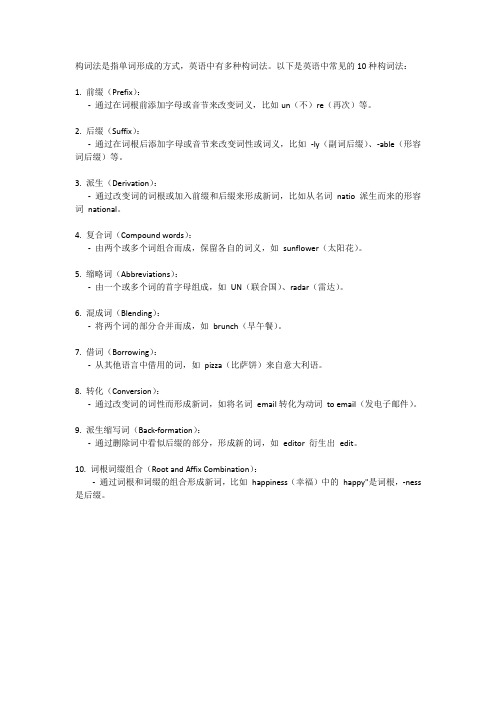
构词法是指单词形成的方式,英语中有多种构词法。
以下是英语中常见的10种构词法:
1. 前缀(Prefix):
- 通过在词根前添加字母或音节来改变词义,比如un(不)re(再次)等。
2. 后缀(Suffix):
- 通过在词根后添加字母或音节来改变词性或词义,比如-ly(副词后缀)、-able(形容词后缀)等。
3. 派生(Derivation):
- 通过改变词的词根或加入前缀和后缀来形成新词,比如从名词natio 派生而来的形容词national。
4. 复合词(Compound words):
- 由两个或多个词组合而成,保留各自的词义,如sunflower(太阳花)。
5. 缩略词(Abbreviations):
- 由一个或多个词的首字母组成,如UN(联合国)、radar(雷达)。
6. 混成词(Blending):
- 将两个词的部分合并而成,如brunch(早午餐)。
7. 借词(Borrowing):
- 从其他语言中借用的词,如pizza(比萨饼)来自意大利语。
8. 转化(Conversion):
- 通过改变词的词性而形成新词,如将名词email转化为动词to email(发电子邮件)。
9. 派生缩写词(Back-formation):
- 通过删除词中看似后缀的部分,形成新的词,如editor 衍生出edit。
10. 词根词缀组合(Root and Affix Combination):
- 通过词根和词缀的组合形成新词,比如happiness(幸福)中的happy"是词根,-ness 是后缀。
【语法全解】:派生词构词法
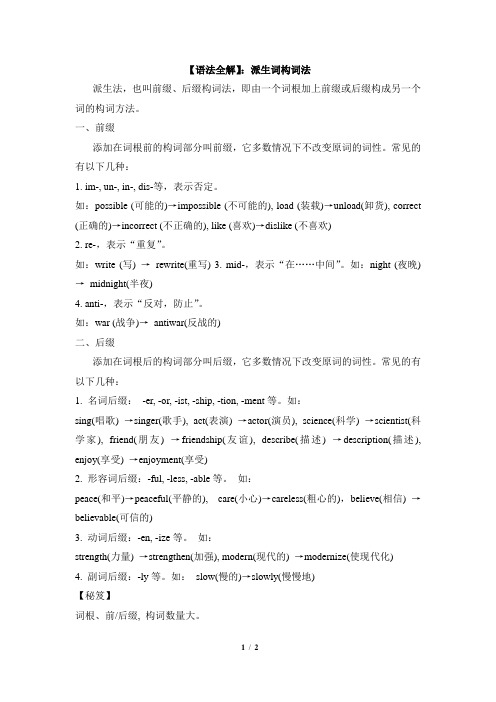
【语法全解】:派生词构词法派生法,也叫前缀、后缀构词法,即由一个词根加上前缀或后缀构成另一个词的构词方法。
一、前缀添加在词根前的构词部分叫前缀,它多数情况下不改变原词的词性。
常见的有以下几种:1. im-, un-, in-, dis-等,表示否定。
如:possible (可能的)→impossible (不可能的), load (装载)→unload(卸货), correct (正确的)→incorrect (不正确的), like (喜欢)→dislike (不喜欢)2. re-,表示“重复”。
如:write (写) →rewrite(重写) 3. mid-,表示“在……中间”。
如:night (夜晚)→midnight(半夜)4. anti-,表示“反对,防止”。
如:war (战争)→antiwar(反战的)二、后缀添加在词根后的构词部分叫后缀,它多数情况下改变原词的词性。
常见的有以下几种:1. 名词后缀:-er, -or, -ist, -ship, -tion, -ment等。
如:sing(唱歌) →singer(歌手), act(表演) →actor(演员), science(科学) →scientist(科学家), friend(朋友) →friendship(友谊), describe(描述) →description(描述), enjoy(享受) →enjoyment(享受)2. 形容词后缀:-ful, -less, -able等。
如:peace(和平)→peaceful(平静的), care(小心)→careless(粗心的),believe(相信) →believable(可信的)3. 动词后缀:-en, -ize等。
如:strength(力量) →strengthen(加强), modern(现代的) →modernize(使现代化)4. 副词后缀:-ly等。
如:slow(慢的)→slowly(慢慢地)【秘笈】词根、前/后缀, 构词数量大。
- 1、下载文档前请自行甄别文档内容的完整性,平台不提供额外的编辑、内容补充、找答案等附加服务。
- 2、"仅部分预览"的文档,不可在线预览部分如存在完整性等问题,可反馈申请退款(可完整预览的文档不适用该条件!)。
- 3、如文档侵犯您的权益,请联系客服反馈,我们会尽快为您处理(人工客服工作时间:9:00-18:30)。
构词法(一)——派生法(Derivation)词根(root)+词缀(affixes)构成新词,前缀法和后缀法。
通常前缀改变意义,后缀改变词性。
一.Prefix 前缀(一)前缀一般不改变词性1. 表达否定意义:dis- 否定,相反,除去(n.前)Eg: dislike v. 讨厌;discover v. 发现im- in- ir- il- ; un- 不,非(adj.或adv.前)Eg: impolite adj. 不礼貌的;impossible adj. 不可能的inconvenient adj. 不方便的incorrect adj. 不正确的;irregular adj. 不规律的;irresponsible adj. 不负责任的;illegal adj. 违法的;illiterate 不识字的unhappy adj. 不开心的;unforgettable adj. 无法忘记的non- 无,非,不(n.或adj.前)Eg: nonconductor n. 绝缘体;nonsense n. 胡说,废话mis- 错,误,恶(v.前)Eg: mistake n.&v. 错误,误解;misunderstand v. 误解for- 弃,禁Eg: forget v. 忘记forbid v. 禁止2. fore- 先,前Eg:forecast v. 预报;foretell v. 语言3. pre- 预先,之前的Eg: predict v. 预测prepare v. 准备4. post- 在……之后Eg: postwar adj.战后的;postgraduate n. 研究生5. mid- 中Eg:mid-term n. 期中的; middle n. 中间6. re- 重新,再一次,复(v.前)Eg: repeat v. 重复;return v. 返回,还;recycle v. 循环7. tele- 远,电(简写中常省略)Eg: telephone n. 电话;telescope v. 望远镜8. ex- 离开,前Eg: exit n. 出口ex-president n. 前总统9. self- 自动,自我Eg: self-assessment n.自我评价self-confident adj. 自信的10. over- 过于,翻Eg: overuse n. 过度使用overturn v. 打翻11. under- 不够Eg: underestimate v. 低估;12. trans- 跨越,移Eg: transportation n. 交通运输;transplant v. 移植13. micro- 微型,微缩Eg: microscope n. 显微镜; microwave n. 微波,微波炉14. mini- 特小的Eg: miniskirt n. 迷你裙minibus 迷你公交车15. semi- 半Eg: semi-final n. 半决赛;semicircle n. 半圆16. mono- 单Eg: monologue n. 独白monopoly n. 垄断17. bi- 双Eg: bicycle n. 自行车bimonthly adj. 双月的18. tri- 三Eg: triangle n. 三角形triplet n. 三胞胎19. multi- 多Eg: multimedia n. 多媒体multinational adj. 多国的20. auto- 自动Eg: automatic adj. 自动的automobile n. 汽车21. sub- 下面的Eg: subway n. 地铁subtitle n. 字幕,副标题22. super- 超级,上层Eg: superman n. 超人;supermarket n. 超市23. inter- 之间的,相互Eg: international adj. 国际的Internet n. 超市(二)改变词性的前缀1. a- 向里,离开,加强(v.或n.前构成adj.或adv.,adj.前构成prep.或adv.)Eg: awake adj. 醒着的; along prep.沿着,顺着;aside prep.&adv. 在……旁边;在旁边2.en- 使成为(n.或adj.前构成v.)Eg: enjoy v. 享受encourage v. 鼓励enable v. 是能够二.Suffix 后缀:(改变词性)1. 名词后缀:1)-ship 状态,身份(n.或adj.后,构成抽象n.)Eg: friendship 友谊;hardship 艰难,困苦2)-ness 状态,性质(adj.后,构成抽象n.)Eg: business 生意;sadness 悲伤;happiness 幸福3)-man 人,男人(n.后)Eg:policeman 警察superman 超人4)-ion 动作,状态(v.后)Eg: action 动作invention 发明decision 决定5)-er, -or 人,动作者,职业(v.后)Eg: writer 作家;waiter 男服务员;actor男演员;doctor 医生6)-ist 职业;主义者(n.后)Eg: pianist 钢琴家;scientist 科学家;revolutionist 革命主义者7)-ese,-(ia)n 人,语言(国名后构成adj.或n.)Eg: Chinese 中国人,汉语;Japanese 日本人,日语;Russian 俄国人,俄语;Italian 意大利人,意大利语8)-th 结果,过程(adj.和v.后,构成抽象n.)Eg:truth 真相;length 长度9)-hood 身份,境遇,状态(n.后)Eg: childhood 童年;neighborhood 邻居10)-ty 性质,状态,程度(adj.后,构成抽象n.)Eg:honesty 诚实;safety 安全11)-age 状态,集合(v.或adj.后)Eg: shortage 短缺;marriage 婚姻12)-ment ……的结果,手段(v.后)Eg: movement 运动;development 发展13)–ure ……的动作或过程(v. 后)Eg: failure 失败;pleasure 愉快;pressure 压力14)–dom ……状态,地位(v.或adj.后)级别、地位(n.后)Eg: kingdom 王国freedom 自由15)–ity (adj.后)Eg: reality 现实;activity 活动;possibility 可能性16)–y 有……倾向的(v后)Eg: difficulty 困难;discovery 发现17)–al ……的过程或状态(v. 后)Eg: arrival 到达;refusal 拒绝;survival 幸存18)–ance ;–ence ……的动作或状态(v.后)Eg: dependence 独立;difference 不同;assistance 协助2. 形容词后缀:1)-ly 品质,……的,每……的(n. 后)Eg: friendly 友好的;weekly 每周的2)-able ;-ible 能够,可……的(v.或n.后)Eg: acceptable 可接受的;unforgettable 无法忘记的3)-ed ……的,动作(v.或n.后)Eg: excited 感到兴奋的;surprised 感到惊讶的4)-ing 属于,性质,动作,状态(n.后构成n.或adj.,加在v.后构成n.)Eg: exciting 令人兴奋的;surprising 令人惊奇的;shopping 购物4)-en 由……制的(n.后)Eg: wooden 木头的;woolen 羊毛的5)-ern 方向(表方向的n.后)Eg: western 西方的;northern 北方的6)-ful 充满,……的(v.或n.后)Eg: colorful 多彩的;wonderful 棒极了7)-less 无……的,没有,不(n.或v. 后)Eg: hopeless 无望的;careless 粗心的8)-ive ……的,有……的(v.后)Eg: active 活跃的;productive 多产的9)-y (充满)……的(n.后)Eg: sporty 运动的;tasty 美味的10)-ish (多为贬义词)像……似的(n.后)Eg:childish 孩子气的,幼稚的;foolish 愚蠢的11)-like 类似;像Eg: childlike 孩子般的,天真的;womanlike 像女人的12)-ous 具有……性质的(n.后)Eg: dangerous 危险的;famous 著名的;courageous 有勇气的13)-some 引起……的;有……倾向的(n.和v.后)Eg: troublesome 麻烦的;handsome 英俊的;tiresome 令人生厌的14)-ary 与……有关的;……的(n. 后)Eg: revolutionary 革命的;customary 通常的,习惯的15)-ate 富于或显示某种性质(n.后)Eg: fortunate 幸运的;passionate 激情的16)-ant;-ent 处于……状态的;进行……动作的Eg: dependent 依赖的;different 不同的;consistent 持续的17)-ic ……的,关于……的Eg: classic 经典的;historic 历史性的;energetic 精力旺盛的18)-al ……的(n.后)……的状态或过程(v.后)Eg: arrival 到达;refusal 拒绝;survival 幸存3. 动词词缀1)-ize; -ise 成为……;使像……;使……化;以……的方式对待或处理;置于(n.或adj.后)Eg: realize 实现;organize 组织;criticize 批评2)-en 使,变得(adj.后)Eg: widen 拓宽;deepen 加深;sadden 使忧伤3)-ify 使得;变得(n.或adj.后)Eg: identify 识别;classify vt.分类,归类4. 副词词缀-ly 品质,……地(adj. 后)Eg: beautifully 优美地;slowly 慢慢地5. 数词词缀:1)-teen 十几(13-19)Eg: fifteen 十五;nineteen 十九2)-ty 几十(整数)Eg: twenty 二十;thirty 三十3)-th 第几(除尾数为1,2,3的)Eg: fifth 第五;ninth 第九6. 代词词缀-self(-selves)反身代词Eg: myself 我自己;ourselves 我们自己。
